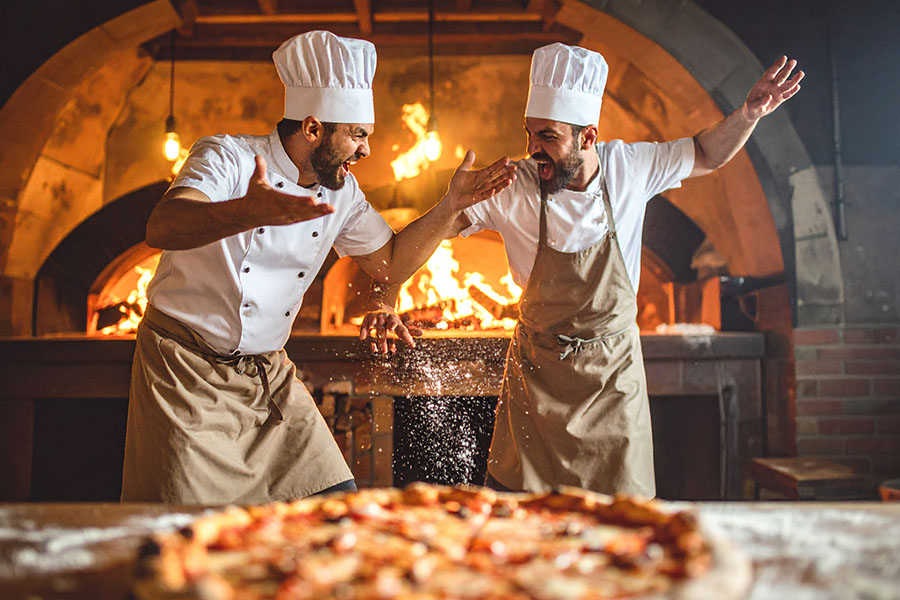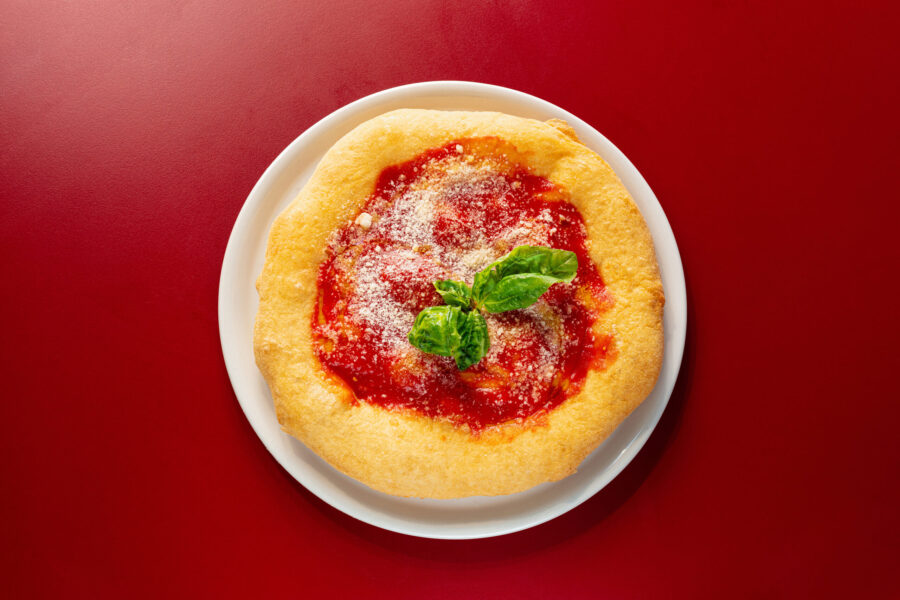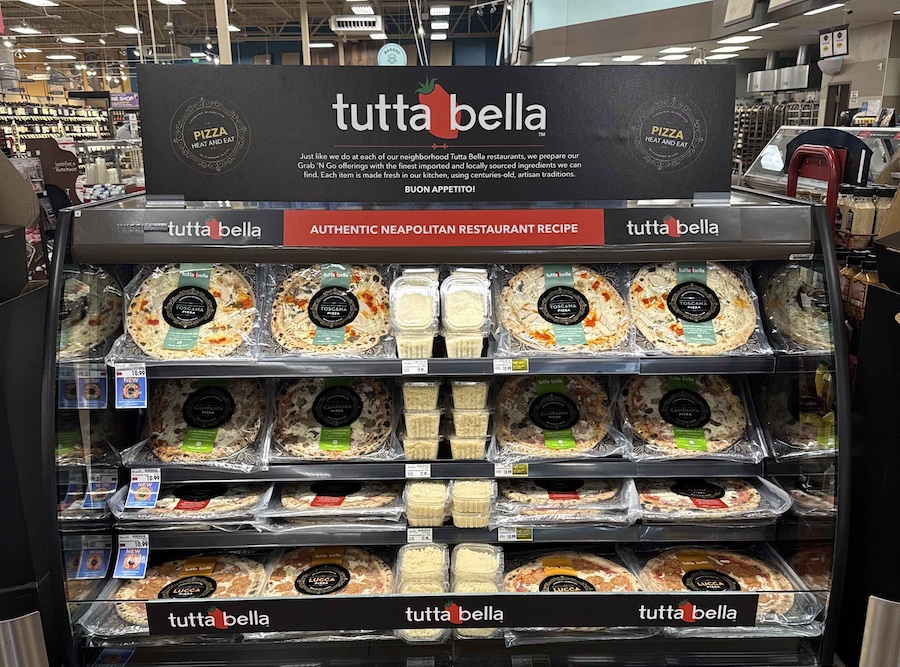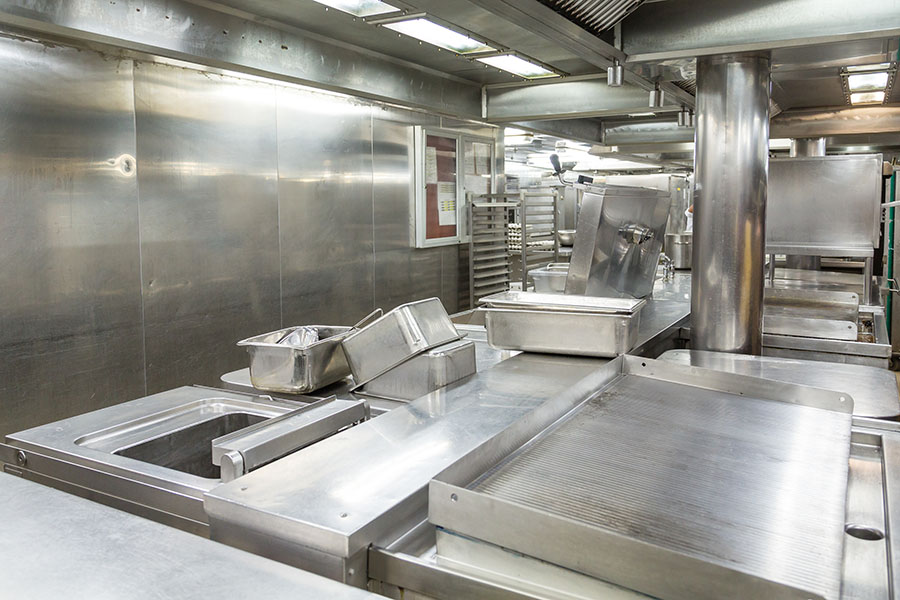
Above: Trips to Pizza and Pasta Northeast or Pizza Expo have turned into great rewards for team members at Caliente Pizza & Draft House in Pittsburgh, Pennsylvania.
Reward Staff in a Practical, Productive Way
It may seem more common to hear about customer loyalty programs but providing incentives for servers and kitchen staff can be just as important—if not more so. Among employees who leave their jobs, 79 percent say a lack of appreciation was a key reason for leaving, per research by O.C. Tanner, a global employee recognition firm. In addition to retaining workers, rewarding performance can help build strong teams, lift a restaurant’s reputation, and drive up sales.
Putting a rewards system in place isn’t usually a task that can be carried out quickly. You’ll want to first consider what your goals are, along with the priorities staff tend to have. Follow these ideas for concepts that can be incorporated into your eatery and could lead to big returns for everyone.
“I have a tri-annual bonus that I give staff, if certain goals are met,” says Nick Herntier, CEO of Pizza Man in Shakopee, Minnesota. The goals for Herntier’s establishment typically are set around sales, and often involve increasing the level of sales for a current period compared to the level of sales during the same time frame the prior year. A goal might be: “Beat 2019’s January to April sales during the 2020 January to April period.” The amount of the bonus is determined by calculating how much sales improved from previous time frame to the current one.
Once the time period is complete, to distribute the bonus, Herntier takes the number of hours that each employee worked and adds them together to find the total number of hours worked. He then divides the number of hours each staff member worked by the total number of hours worked to determine the percentage of hours each person worked. “That’s roughly their share of the bonus,” he says.
The strategy has led to benefits in both sales and customer service. “It definitely helps people remember to upsell items, and even be nice to the customer,” Herntier says. “I train them this way to look toward the future of the customer. If they make the customer happy, they’ll come back, making their bonus even easier to get.”
Herntier makes the bonus available only to employees who have worked the entire sales period. If the sales period runs from May to August, employees who have worked during that time period are eligible; others are not. This setup helps with retention, Herntier notes. Employees also value the extra rewards. “For most part-time employees, it’s almost like an extra free paycheck,” he says.
In restaurants and other food services, millennials make up 49 percent of the workforce, according to a 2019 Business Insider report. If your staff consists of mostly millennials or younger workers, you’ll want a rewards program that resonates with this demographic. To connect and improve overall performance among millennials, link any awards system to your core values, says Jim Schroeder, a marketing manager at Online Rewards, an incentives and loyalty marketing company. “This reinforces positive behavior in your employees.” If one of your core values is to be eco-minded, you might align rewards with a reduction in waste or new ideas to recycle and reuse from staff members.
To help motivate millennials, consider personalizing the rewards given. Rather than giving out a predetermined prize to an employee, let the individual choose. For instance, you might give each server a sheet that looks like a bingo card. On each space, list a menu item. When a server sells a dish listed in a box, the item can be crossed out. Once all spaces are crossed out, the server could choose a prize from a collection of options. You might keep some merchandise, water bottles or gift cards to retailers in a certain spot in the back where employees can see them. This visual aid could also help encourage servers to strive toward their goal.
Millennials are accustomed to quick solutions. With that in mind, a program that is designed to spotlight accomplishments soon after they occur might work well in a pizzeria abuzz with millennial workers. If you have a goal tied to an event, such as selling a certain number of pies during a holiday weekend, you might offer a reward to employees if the team is able to surpass that goal. Then if the goal is exceeded, you can hand out prizes at an employee meeting the following week or hold an employee party in the restaurant during the next days.
If you want to encourage staff to follow food safety guidelines or other safety procedures, a program built around your needs can increase awareness and involvement. Start by outlining what safety goals you have for the place. “Make sure the overall structure of your program is designed with those goals clearly in mind,” Schroeder advises.
You might first hold a meeting to outline cleaning guidelines, hygiene rules and ways to handle food properly. Then try adding a little competition to reinforce the principles. “Gamified quizzes and contests can be great ways to educate your employees on important safety practices in a fun and engaging manner,” Schroeder says. Employees could fill out a questionnaire on safety after studying the guidelines you have established for the restaurant. Those who score well on the test might get a coupon for a free meal at the restaurant with a guest or a complimentary slice of pizza and beverage.
Long-term employees are often highly committed to the place and its offerings. To reward high-performing staffers that have been with you for a significant period, think about naming a menu item after them, such as Eric’s Signature Margherita or Patricia’s Favorite Calzone. “Chances are, your employees will brag about it on social media, bringing in their friends and family,” says William Taylor, career development manager at VelvetJobs.
If your place is looking to add new dishes, challenge your kitchen staff to come up with their own unique twists on your classic items. Have employees sample and rate them. “Reward the best-tasting items by putting their namesake creation on the menu,” Taylor says.
Rachel Hartman is a freelance writer who covers small business, finance and lifestyle topics.







